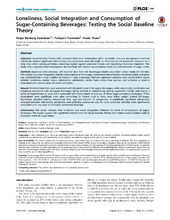| dc.contributor.author | Henriksen, Roger Ekeberg | |
| dc.contributor.author | Torsheim, Torbjørn | |
| dc.contributor.author | Thuen, Frode | |
| dc.date.accessioned | 2015-03-18T11:59:49Z | |
| dc.date.available | 2015-03-18T11:59:49Z | |
| dc.date.issued | 2014-08-08 | eng |
| dc.identifier.issn | 1932-6203 | |
| dc.identifier.uri | https://hdl.handle.net/1956/9572 | |
| dc.description.abstract | Objective: Social Baseline Theory (SBT) proposes that close relationships aid in metabolic resource management and that individuals without significant relationships may experience more demands on their own neural metabolic resources on a daily basis when solving problems, remaining vigilant against potential threats and regulating emotional responses. This study tests a hypothesised consequence derived from SBT: relative social isolation leads to increased levels of sugar intake. Methods: Based on cross-sectional, self-reported data from the Norwegian Mother and Child Cohort Study (N = 90 084), information on social integration and the consumption of both sugar-sweetened and artificially sweetened sodas and juices was obtained from a large number of women in early pregnancy. Multiple regression analyses were conducted to assess whether loneliness, marital status, relationship satisfaction, advice from others than partner, and cohesion at work is associated with consumption of sodas and juices. Results: Perceived loneliness was associated with elevated intake of all sugary beverages, while relationship satisfaction was negatively associated with all sugary beverages. Being married or cohabitating, having supportive friends, and having a sense of togetherness at work were associated with lower intake of two out of three sugar-containing beverages. These associations were significant, even after controlling for factors such as body mass index, weight related self-image, depression, physical activity, educational level, age and income. In comparison, a statistically significant relationship emerged between relationship satisfaction and artificially sweetened cola. No other predictor variables were significantly associated with any type of artificially sweetened beverage. Conclusions: This study indicates that loneliness and social integration influence the level of consumption of sugary beverages. The results support the hypothesis derived from the Social Baseline Theory that relative social isolation leads to increased levels of sugar intake. | en_US |
| dc.language.iso | eng | eng |
| dc.publisher | PLOS | eng |
| dc.relation.ispartof | <a href="http://hdl.handle.net/1956/13065" target="_blank">Social relationships, stress and infection risk in mother and child</a> | |
| dc.rights | Attribution CC BY | eng |
| dc.rights.uri | http://creativecommons.org/licenses/by/4.0/ | eng |
| dc.title | Loneliness, social integration and consumption of sugar-containing beverages: Testing the social baseline theory | eng |
| dc.type | Peer reviewed | |
| dc.type | Journal article | |
| dc.date.updated | 2015-03-03T15:03:05Z | en_US |
| dc.description.version | publishedVersion | |
| dc.rights.holder | Copyright 2014 Henriksen et al. This is an open-access article distributed under the terms of the Creative Commons Attribution License, which permits unrestricted use, distribution, and reproduction in any medium, provided the original author and source are credited. | |
| dc.source.articlenumber | e104421 | |
| dc.identifier.doi | https://doi.org/10.1371/journal.pone.0104421 | |
| dc.identifier.cristin | 1147092 | |
| dc.source.journal | PLoS ONE | |
| dc.source.40 | 9 | |
| dc.source.14 | 8 | |
| dc.subject.nsi | VDP::Social sciences: 200::Psychology: 260::Social and occupational psychology: 263 | eng |
| dc.subject.nsi | VDP::Samfunnsvitenskap: 200::Psykologi: 260::Sosial- og arbeidspsykologi: 263 | nob |

